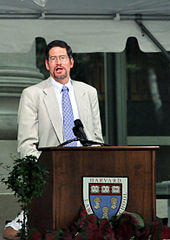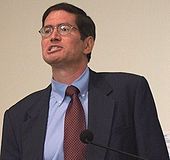Michael J. Klarman is an American legal historian and scholar of constitutional law.[1]
Currently, Klarman is the Kirkland & Ellis Professor at Harvard Law School.[2] Formerly, he was James Monroe Distinguished Professor of Law, Professor of History, and Elizabeth D. and Richard A. Merrill Research Professor at the University of Virginia School of Law.[3]
Early life
Klarman grew up in Baltimore. His father was a public health economist.[4] He is the brother of investor Seth Klarman.[5]
Education
Klarman holds a J.D. from Stanford Law School, a D.Phil. from Oxford University (where he was a Marshall Scholar) and an M.A. and B.A. from the University of Pennsylvania.[6] After his graduation from law school, he clerked for then-Judge Ruth Bader Ginsburg when she was on the United States Court of Appeals for the District of Columbia Circuit.[7][8]
Scholarship
Klarman specializes in the constitutional history of race.[9] He contends that the Supreme Court of the United States has historically been hostile to the rights of minorities and has not consistently enforced constitutional protections for them. Klarman argues that civil rights protections arise out of social mores from which the court takes its cue.[1][10]
Klarman has also defended political process theory as a method of constitutional interpretation.[11]
Awards
- 2005 Bancroft Prize
Works
- Discussion between Klarman and Michael W. McConnell regarding Brown v. Board of Education
- McConnell, Michael W. (May 1995). "Originalism and the desegregation decisions". Virginia Law Review. 81 (4): 947–1140. doi:10.2307/1073539. JSTOR 1073539.
- Response to McConnell: Klarman, Michael J. (October 1995). "Response: Brown, originalism, and constitutional theory: a response to Professor Mcconnell". Virginia Law Review. 81 (7): 1881–1936. doi:10.2307/1073643. JSTOR 1073643.
- Response to Klarman: McConnell, Michael W. (October 1995). "Reply: The originalist justification for Brown: a reply to Professor Klarman". Virginia Law Review. 81 (7): 1937–1955. doi:10.2307/1073644. JSTOR 1073644.
- Klarman, Michael J. (June 2002). "Is the Supreme Court sometimes irrelevant? Race and the Southern Criminal Justice System in the 1940s". The Journal of American History. 89 (1): 119–153. doi:10.2307/2700787. JSTOR 2700787.
- Klarman, Michael J. (2004). From Jim Crow to civil rights: the Supreme Court and the struggle for racial equality. Oxford University Press. ISBN 9780195129038. Preview.
- Klarman, Michael J. (2007). Unfinished business: racial equality in American history. Oxford University Press. ISBN 9780195304282. Preview.
- Klarman, Michael J. (2007). Brown versus Board of Education and the civil rights movement. Oxford University Press. ISBN 9780195307634. Preview.
- Klarman, Michael (October 14, 2016). The Framers' Coup: The Making of the United States Constitution. Oxford University Press. ISBN 978-0199942039.
References
- ^ a b "Professor Michael Klarman delivers address on the Supreme Court and race at the American Academy of Arts & Sciences". Retrieved 1 July 2012.
- ^ http://www.oah.org/activities/lectureship/2009/lecturer.php?id=19
- ^ http://www.virginia.edu/history/user/67
- ^ Klarman, Michael. "A Skeptical View of Constitution Worship". Retrieved 13 May 2011.
- ^ "Herbert Klarman, 82, professor, health economist", Baltimore Sun, June 19, 1999.
- ^ http://www.wsc.edu/alumni/news/archive/091108_centennial.php
- ^ Kevin Zhou (January 24, 2008). "Constitutional Law Professor Klarman Joins HLS". The Harvard Crimson.
- ^ "Michael Klarman to join HLS faculty," Harvard Law School press release, January 24, 2008.
- ^ Scott, Janny (March 23, 2008). "What Politicians say When They Talk About Race". The New York Times. Retrieved 13 May 2011.
- ^ Klarman, Michael. "A Skeptical View of Constitution Worship". Retrieved 13 May 2011.
- ^ Klarman, Michael J. (May 1991). "The Puzzling Resistance to Political Process Theory". Virginia Law Review. 77 (4): 747–832. doi:10.2307/1073297. JSTOR 1073297.

